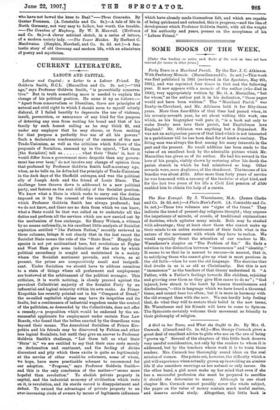The New Evangel. By J. Warschaner, M.A. (James Clarke and
Co. 2s. 6d. net.)—A Plain Man's Faith. (A. Constable and Co. 55. net.)—These two volumes are "signs of the times." They indicate the trend of present-day religious thought ; they express the impatience of miracle, of creeds, of traditional explanations of doctrine, which agitates many minds. Both may be studied with advantage ; they at least show those who cannot make up their minds to an entire restatement of their faith what is the nature of the movement with which they have to reckon. We would especially direct the attention of our readers to Mr. Warschauer's chapter on " The Problem of Sin." He finds a solution in the distinction between " immanence" and "identity" It seems to us that he is nearest to success—is nearest, that is, to satisfying those who cannot give up what is most precious in the old faith—when ho uses the old language. The doctrine that God dwells in us is as old as Christianity. But this is not "immanence" as the teachers of that theory understand it. "A Father, with a Father's feelings towards His children, rejoicing and grieving over them as they give Him cause to do so" ; "God injured, love struck to the heart by human thanklessness and disobedience,"—this is language which we have heard a thousaqd times, and cannot hear too often; but it is more in harmony with the old evangel than with the new. We can hardly help feeling that, do what they will to restate their belief in the new terms, Mr. Warschauer and his friends will have to come to Spinoza. The Spinozists certainly welcome their movement as friendly to their philosophy of religion.










































 Previous page
Previous page